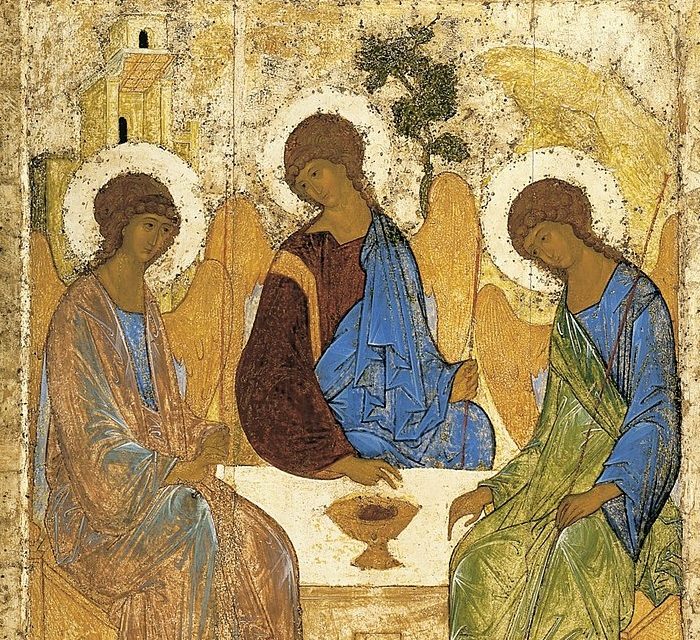In a previous lectionary post years ago on a different cycle of readings for Trinity Sunday, I wrote:
Too often, the Trinity is presented as a mystery, and sometimes this sense of mystery is simply presented as a puzzle. The Trinity can’t really be explained, because God can’t really be explained. It’s all a great mystery. We have to take it on faith. For all the ways in which those statements are obviously true, the readings for Trinity Sunday make clear that the real meaning of the Trinity is not puzzling uncertainty, but astonishing knowledge of who God is.
Well, it turns out that this year’s Cycle A readings also confirm this lesson. None of them speak about the incomprehensibility of God, or utter phrases like “my ways are not your ways.” Rather, they make clear that the Trinity is about God revealed. Revealed as what?
First and foremost, revealed as love. The trinity is the teaching not that God is loving, but that God really is LOVE. God is the communion of Three persons. Ultimate being is being-in-relationship. The meaning of personhood is gift. These are all claims rooted in the revelation of God’s very essence. This is also why, when we stress things like “you can’t put God in a box” or the diversity of divine manifestations, we have to stop ourselves at some point and ask: has God really revealed Godself at a fundamental, essential level? And hopefully we recognize that the answer must be yes. The “box” for God is the love box, the communion box.
Why can’t we get that right? The reading also suggest that such a revelation of God comes to a world not well-disposed to receive it. In the first reading, Moses encounters God as “merciful and gracious… slow to anger and rich in kindness.” And he responds by humbly asking God to come to his “stiff-necked” people. In the Gospel, after hearing the “good news” of John 3:16, that “God so loved the world,” we hear in the less-quoted John 3:18 that anyone who does not believe in the revelation of God’s love in Christ “has already been condemned.” The lectionary somewhat unhelpfully cuts off Jesus’ discourse with Nicodemus here. The discourse goes on to make it clear that the issue is not so much some kind of 19th century conversation to Christ as personal lord and savior, but rather that “people preferred darkness to light, because their works were evil.” We are stiff-necked to the end.
Catholics will spend much time debating the “evil works” meant here. Some might point to the sexual revolution. Others point to the industrialist/capitalist revolution. There’s a lot of pointing. So it’s interesting to read the second reading in this light. The reading seems to be chosen for its usage of the traditional greeting in the name of the Trinity – one will hear automatic murmurs of “and with your spirit” at mass this weekend, no doubt. But it comes at the very end of a second lengthy missive to those fractious Corinthians, whose many quarrels have occupied Paul at great length over the course of his long letters. They argued about a lot of stuff, too.
Paul does not merely placate them; he criticizes, offers insights, suggests some things might be ok and others not. The Corinthian letters are a command performance for pastorally-oriented moral theology that are too often ignored. But he does insist on one thing. In First Corinthians 13, famously, he insists on love (caritas, not romantic love) as the necessary complement of any and every spiritual gift, without which they are nothing. And in this letter, he concludes:
Mend your ways, encourage one another,
agree with one another, live in peace
It is with this exhortation, to live in communion even amidst un-mended ways (which still should be mended!), that he then offers his invocation of the Trinity. If we are to be called “stiff-necked” or are to be accused of “evil works,” first and foremost, those of works of division rather than communion. They are works that (as happened in Corinth) in which Christians divide among different camps (in Corinth, Cephas and Apollos; today, we know it still happens), and these camps find communion… but not communion in Christ, in the one revealed God. We prefer human communions to God’s communion. God, being love, still loves us. But when we truly love this God, hopefully we will then see that we must do much better heeding St. Paul’s exhortation to make peace with one another, and not continually divide.



